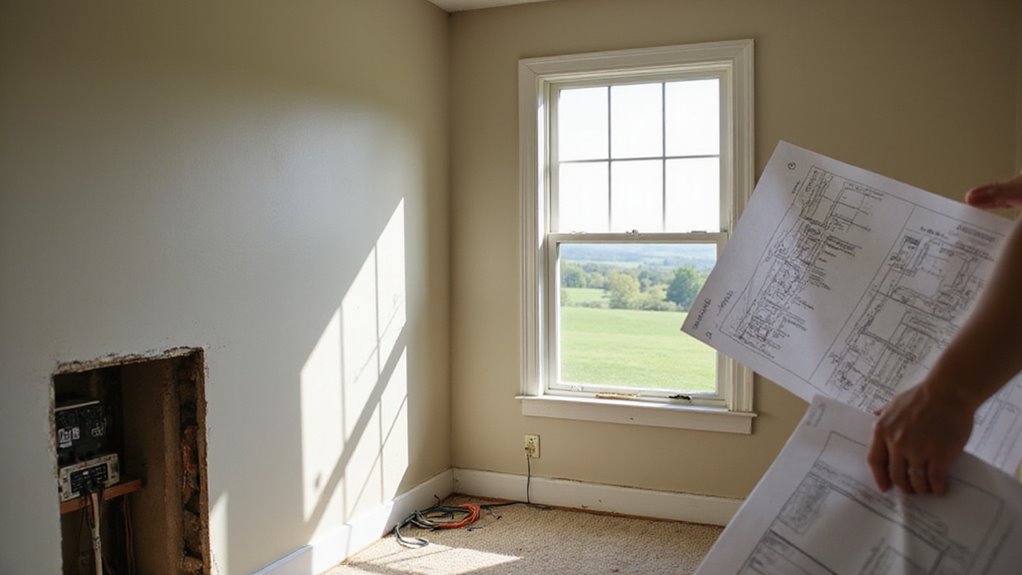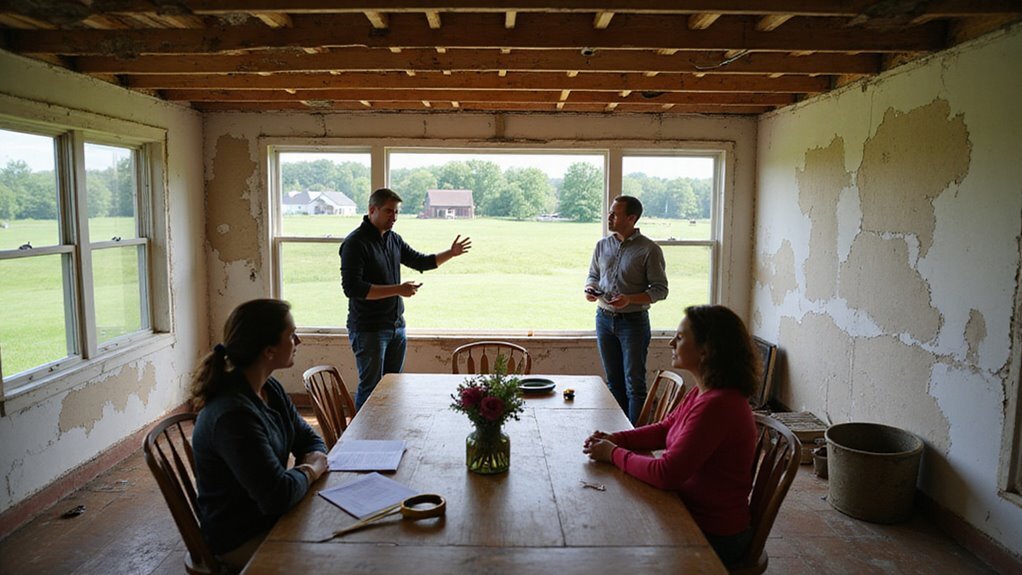Selling a house with unpermitted work in Kentucky can be stressful and confusing. Many sellers worry about lost deals or legal trouble. Buyers often hesitate when they discover work was done without proper permits.
This problem can cause serious delays and lower your sale price. Unpermitted work may scare off buyers or invite fines from local authorities. Kentucky also has specific disclosure rules, making things more complicated for sellers.
You can sell a house with unpermitted work in Kentucky by disclosing all issues and exploring your repair or negotiation options.
Knowing your obligations and possible solutions can help you avoid headaches. Careful planning can turn a complicated sale into a smoother process. This blog will guide you step by step so you can sell your Kentucky house—even with unpermitted work.
Key Takeaways
- Disclose all known unpermitted work honestly using Kentucky’s Property Condition Disclosure Form and provide any supporting documentation to buyers.
- Consult with your local building department to explore retroactive permitting or correction options before listing the property.
- Maintain detailed records of all unpermitted modifications, including photos, receipts, and official communications, to demonstrate transparency and due diligence.
- Work with a knowledgeable Kentucky real estate agent to verify permits, assess risks, and ensure legal compliance throughout the selling process.
- Consider negotiating with buyers through price reductions, repair credits, or selling as-is—potentially to cash buyers who accept unpermitted work.
Understanding What Constitutes Unpermitted Work

Unpermitted work means any changes to a home made without the needed permits from local authorities. This includes construction, remodeling, or adding new features. If work is done without approval, it is considered unpermitted.
Homeowners must get permits for important work, such as electrical or plumbing changes. Kentucky law requires you to share information about unpermitted work with buyers. If you do not, you could face legal issues during the sale. Failing to disclose unpermitted work can also lead to legal penalties and complicate negotiations with potential buyers.
Always check permit records before selling your house. If there is unpermitted work, consider getting it approved or repaired. This helps avoid problems and ensures a smoother sale. In some cases, title issues caused by unpermitted work or undisclosed liens can complicate the selling process, so addressing these problems early is important.
Common Types of Unpermitted Work in Kentucky Homes
You’ll often encounter finished basements completed without proper permits and unauthorized electrical upgrades in Kentucky homes. These changes can violate local building codes, exposing you to legal risks and safety concerns. Understanding how these specific unpermitted projects impact your sale is critical for compliance and negotiation.
In some cases, selling your home as-is can provide a quick solution if you want to avoid the hassle and expense of bringing the work up to code. Additionally, being honest about full disclosure of all known defects is essential in Kentucky to avoid legal complications and establish trust with potential buyers.
Finished Basements Without Permits
Finished basements are often done without permits in Kentucky homes. If you want to sell your house, this can be a problem. Kentucky law says you must tell buyers about any basement finished without a permit.
An unpermitted basement can make selling harder. Buyers or inspectors may worry about safety and building codes. This could affect your home’s value or slow down the sale.
You should collect any paperwork about the basement’s work. If you are unsure, talk to your real estate agent or a lawyer. Being open about unpermitted work can help avoid surprises during the sale.
Unauthorized Electrical Upgrades
Unauthorized electrical upgrades are common in Kentucky homes. These upgrades often create problems when selling a house. Kentucky law requires all electrical work to follow safety codes and be done by licensed professionals.
If you skip permits or use an unlicensed worker, buyers and inspectors will notice. You may face legal and financial trouble if the work does not meet state standards. Problems include code violations, fines, and possible delays during the sale process.
If work was done without a permit, you should pay permitting fees and get a retroactive permit. An unlicensed contractor’s work should be checked by a licensed electrician. If the home fails inspection, fix the problems and schedule another inspection.
Unreported upgrades can cause buyers to lose trust or ask for a lower price. It is important to disclose all electrical work and provide proper documentation. Following these steps can help avoid bigger issues later.
Legal Requirements for Disclosing Unpermitted Work

When you sell a house in Kentucky, state law requires you to disclose any known unpermitted work to potential buyers. Failing to provide this information can expose you to serious legal consequences, including lawsuits for misrepresentation or contract rescission.
It’s essential to understand these disclosure obligations to protect yourself during the transaction. Title companies and attorneys can help ensure you meet your disclosure obligations and avoid issues at closing. Proper documentation of repairs and issues is essential for compliance and transparency throughout the sales process.
Kentucky Disclosure Laws
In Kentucky, you must tell buyers about unpermitted work when selling your house. State law requires you to fill out a Property Condition Disclosure Form. The form directly asks if there are any unpermitted changes or improvements.
You cannot hide unpermitted work with home staging or virtual tours. If you know about unpermitted work, you must report it. Disclosure is not optional, even if the home looks fine.
Buyers have the right to know about any issues. If you leave out information, buyers can cancel the sale. This rule applies to all sales, including when you sell without an agent.
Failing to disclose can lead to fines or the sale being undone. Kentucky takes these requirements seriously. Always complete the disclosure form honestly to avoid legal trouble.
Potential Legal Consequences
Not telling buyers about unpermitted work on your Kentucky property can lead to legal trouble. Kentucky law says sellers must share known problems, including any unpermitted changes. If you hide these changes, you risk serious consequences.
A home inspection might uncover unapproved work. If this happens, you could face lawsuits or be ordered by a court to fix the problems. You might also have to pay fines or compensate the buyer.
Delays or canceled sales can occur if buyers find out about unpermitted work. If problems appear after the sale, the new owners could sue you. Always tell buyers about any unpermitted work to avoid these risks.
How Unpermitted Work Can Affect Your Home’s Value
Unpermitted work often lowers your home’s value in Kentucky. Buyers worry about legal and safety issues. They may offer less money because of these concerns. In Kentucky, homes with unpermitted work often sell for less due to buyers’ concerns over legal and safety risks.
Appraisers might reduce your home’s value to cover the cost of making repairs or getting permits. Lenders can also deny loans for homes with unpermitted work. If this happens, you may only attract buyers who can pay cash. When you need to sell quickly, exploring cash buyer options can simplify the process and help you move forward with your relocation.
Even professional staging or good upkeep cannot hide unpermitted changes. Buyers may ask for price cuts or other concessions. If you want to sell, you should be honest about any unpermitted work.
Pricing your home below similar homes with permits can help attract more interest. If you do not disclose issues, you risk disputes later. Expert advice can help you set a fair price and avoid problems during negotiations. In addition, having proper documentation and being transparent about property issues—such as unpermitted work—can help build buyer confidence and comply with legal requirements during the sale process.
Potential Risks of Selling a House With Unpermitted Work

Selling a house with unpermitted work in Kentucky comes with serious risks. Unpermitted work means changes were made without required approval. Kentucky law requires you to tell buyers about any known problems, including unpermitted work.
If you do not disclose this, buyers could sue you for hiding information. Local building officials might fine you or require expensive fixes. Lenders may refuse to finance homes with unpermitted work. Failing to resolve unpermitted work can also prevent you from having a clear title, which is essential for a smooth and legal property transfer.
Insurance companies can deny claims for damage in those areas. You might be forced to remove or redo the unpermitted work after the sale. Ignoring these risks can cause delays, extra costs, or legal trouble.
Always check your legal risks before putting your house on the market. If you are unsure, talk to a real estate professional or attorney. This helps you avoid bigger problems later. Proper documentation and disclosure are essential to prevent legal penalties and to build trust with buyers.
Identifying Unpermitted Work Before Listing
Before selling your house in Kentucky, check if any renovations were done without the right permits. Look for changes like added rooms, finished basements, or updated plumbing and electrical work. If you find differences from county records or original plans, unpermitted work may exist.
You should review all records and compare them to your home’s current condition. If you are unsure, a home inspector or real estate attorney can help. They can point out issues you might have missed. In some cases, unpermitted work can affect your ability to sell if it impacts the loan application process or the buyer’s ability to obtain a mortgage.
Unpermitted work can cause problems during a buyer’s inspection or appraisal. It may also affect your home’s appearance if the work is unfinished. Properly identifying these issues helps you stay transparent and avoid surprises when selling.
It’s also smart to prepare the required paperwork early to ensure the sale process goes smoothly and to avoid legal complications related to unpermitted work.
Options for Addressing Unpermitted Work

If you find unpermitted work in your Kentucky home, you must deal with it before selling. Unpermitted work can hurt your sale or lower your home’s value. You need to know your options and what each option means for you.
You can tell buyers about the unpermitted work to avoid legal trouble. If the work can be permitted, you might apply for retroactive permits. Some owners choose to remove or fix the work to meet local rules. Before finalizing your plans, it’s wise to conduct a title search to ensure there are no hidden liens or debts related to the unpermitted work.
You may also negotiate with buyers, offering price cuts or repair credits. Selling the home “as-is” is another choice, but it may reduce buyer interest. Each option has its own risks and benefits, so consider your situation before deciding. In some cases, selling to cash home buyers can be a fast solution if you want to avoid repairs or lengthy negotiations.
Navigating the Permit Process in Kentucky
Kentucky law has a specific process to handle unpermitted work. You must contact your local building department to report the work. They will guide you on the next steps. If you discover unpermitted work in Kentucky, reach out to your local building department—they’ll walk you through the necessary steps.
The authorities may ask for detailed plans or require inspections. Sometimes, you must correct the work to meet current codes. All changes need proper documentation.
If you do not get permits, it can affect your home sale. Missing permits may also make staging or open houses harder. Proper paperwork helps avoid these issues.
Once you have permits and pass inspections, keep proof of compliance. This documentation reassures buyers and agents during transactions. Following the process protects you and helps market your home.
If you prefer to avoid the hassle and uncertainty, you might consider selling your house as-is for a fair cash offer to a local buyer who specializes in homes with issues like unpermitted work.
Deciding Whether to Remedy or Sell As-Is

When selling a house with unpermitted work in Kentucky, you must choose to fix the issue or sell as-is. Fixing the work can increase your home’s value and attract more buyers. Selling as-is may be faster but could lower your price and limit buyer interest.
Remedying the unpermitted work often needs extra money and time. If you have the budget and time, fixing the issue can help your home pass inspection. This may also make negotiations and closing easier.
Selling as-is requires you to fully disclose the unpermitted work. Investors or bargain hunters may be interested, but they might offer less money. Even with home staging, some buyers may see the unpermitted work as a risk.
Consider the cost of permits and repairs before deciding. Look at how the unpermitted work could affect your home’s appraisal and buyer expectations. Weigh these factors to choose the best option for your situation.
Best Practices for Disclosing Unpermitted Work to Buyers
To comply with Kentucky law, you must accurately disclose any unpermitted work on your property using the state’s required forms. You should clearly outline the risks buyers may face, such as future code violations or repair expenses. It’s essential to document all known modifications, providing transparency and legal protection throughout the transaction.
Kentucky Disclosure Law Requirements
Kentucky law requires home sellers to disclose important property details. If your property has unpermitted work, you must tell buyers. This is done using the Seller’s Disclosure of Property Condition form.
You must fill out this form honestly and completely. If you know about unpermitted additions or repairs, you need to include them. Failing to disclose can lead to legal trouble.
The form should list the type and amount of unpermitted work. You also need to mention any permits that were applied for or denied. If possible, include copies of related documents.
Consulting a real estate attorney is smart for complex issues. This process helps protect both you and the buyer. Honest disclosure builds trust and avoids future problems.
Explaining Potential Buyer Risks
Unpermitted work can create serious risks for buyers. Kentucky law says you must disclose any work done without permits. Buyers need to understand why these risks matter.
If the work is not permitted, insurance companies might deny claims. Buyers could have to pay for repairs to meet code requirements. This can lead to unexpected costs.
Unpermitted work may also make it hard to sell the property later. Some buyers could walk away if they find out about these issues. Safety problems could put people at risk for injury.
If you are honest about these risks, you protect both yourself and the buyer. Transparency helps everyone make better decisions.
Documenting Unpermitted Modifications
Buyers must understand all unpermitted work done on your Kentucky property. You should document every change clearly to be open and honest. Full records help prevent confusion and protect everyone involved.
Good documentation can affect your home’s value and mortgage approval. Kentucky law requires you to share details about unpermitted work. Missing information might make buyers walk away or slow down the sale.
Your records should include photos of every unpermitted change, labeled by date and place. Receipts from contractors or material purchases should be included if you have them. Written descriptions must explain what was changed and when.
If you received city or county code violation notices, add them to your file. Any talks with building officials should also be included. Detailed records help buyers decide on repairs and protect you from legal problems later.
Negotiating With Buyers Over Unpermitted Work
When unpermitted work is found during a home sale in Kentucky, buyers may worry about risks and extra costs. Sellers should respond by clearly explaining the situation and showing any documents they have. If buyers ask, sellers can offer solutions like getting retroactive permits or lowering the price.
Homeowners can also make the house look appealing and use social media to find buyers open to some risk. Some buyers may ask for extra protections, such as money held in escrow or special contract terms. Sellers who stay flexible and willing to solve problems can keep the deal moving forward.
If sellers handle concerns quickly and honestly, buyers are more likely to stay interested. Good communication and a fair approach help prevent the sale from falling through.
Working With a Real Estate Agent Who Understands Local Laws
You need a real estate agent who knows Kentucky’s local laws to guide you through strict disclosure requirements and reduce your liability. With their expertise, you’ll accurately assess the risks tied to permit violations and develop a compliant strategy. They’ll also help you negotiate confidently with buyers who understand the legal landscape.
Navigating Disclosure Requirements
Sellers in Kentucky must tell buyers about any known defects in their home. If there is unpermitted work, you must disclose it honestly on the disclosure form. Failing to do so can lead to legal issues.
A real estate agent who knows Kentucky law can help you with these requirements. The agent will make sure you fill out all forms correctly. They can also help you list any unpermitted changes to the property.
Unpermitted work can change your home’s value and affect a buyer’s decision. Buyers may also face problems getting a loan if work was not permitted. If you disclose everything, you help buyers plan for possible repairs or extra costs.
Proper disclosure can also affect how you prepare your home for sale. Visible unpermitted work may change how buyers see your property. If you are open about these issues, you reduce the risk of future disputes.
Assessing Permit Violation Risks
Unpermitted work can cause legal and financial problems for both sellers and buyers in Kentucky. You should always check for permit violations before putting your property on the market. If you find any issues, you can avoid surprises and extra costs later.
A real estate agent who knows local building codes can help you spot possible problems. The agent may suggest a home inspection to look for unpermitted work. Inspection results can show if past repairs or changes followed Kentucky laws.
Your agent can also check city records to see if permits exist for previous work. If there are missing permits, you will know what needs fixing or reporting. Taking these steps helps you deal with violations early and lowers your risk of fines.
Negotiating With Informed Buyers
Sellers in Kentucky should be open when buyers know about unpermitted work. Buyers with this knowledge will expect honest answers and fair prices. A real estate agent who knows Kentucky laws is essential for this situation.
An agent can explain your disclosure duties and help avoid legal trouble. If you have unpermitted work, you must tell buyers clearly. Full disclosure shows honesty and builds trust.
You should set a price that reflects the cost to fix any issues. If needed, you can offer repair credits or set aside money in escrow. These steps can ease buyer concerns and help the sale move forward.
Home staging can highlight rooms that follow code and look appealing. Good curb appeal can also draw buyers in, even if there are concerns. Your agent can help focus attention on your property’s best features.
Work closely with your agent to protect your interests. If you are transparent and flexible, you can negotiate better. This approach helps you avoid problems and close the sale confidently.
Protecting Yourself With Proper Documentation
Proper documentation is important if your Kentucky property has unpermitted work. It can protect you from legal problems and buyer doubts. Documentation shows your effort to follow the rules.
You should collect any old permits, even if they are missing details. Save receipts from contractors, photos of renovations, and emails with workers. These records help show what changes were made.
If you have reports from inspectors or local officials, include them too. These documents show you have tried to be honest. Good records can help you avoid future issues and make buyers feel more confident.
Selling to Investors or Cash Buyers as an Alternative
Selling to investors or cash buyers can be a good option if your home has unpermitted work. These buyers usually accept houses as-is, so you do not need to fix code issues first. Cash buyers are not held back by mortgage rules that may block unpermitted properties.
You do not have to spend money on home staging or repairs. Cash buyers offer fewer contingencies and can close faster than traditional buyers. There is less risk of deals falling through because of financing problems.
If you choose this route, you can sell your home as-is. You will likely avoid long negotiations about repairs or permits. This can help you move on with less hassle and fewer delays.
Conclusion
If you need to sell a house with unpermitted work in Kentucky, honesty is your best strategy. If you disclose all issues and gather the right documents, you can avoid major problems. If you consult professionals, you are more likely to have a smooth transaction.
If you want to skip repairs and sell quickly, we can help. We buy houses for cash in any condition, even with unpermitted work. If you choose this option, you can save time and avoid hassle.
If you’re ready to sell or have questions, OC Real Estate is here to guide you. We can offer you a fair, no-obligation cash offer today. Contact us now to get started and move forward with confidence.

